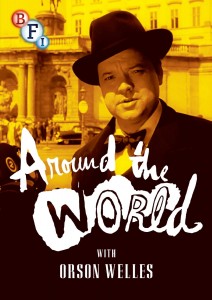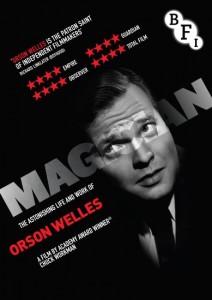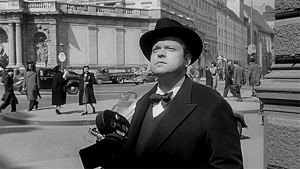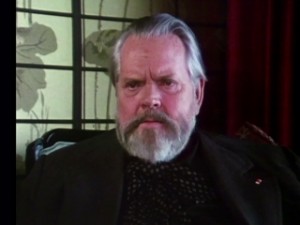Two new British Film Institute digital releases related to Orson Welles, both due out later this month, arrived in my mailbox yesterday, the day after I submitted my Fall DVD column to Cinema Scope —Around the World with Orson Welles (1955) on Blu-Ray and Chuck Workman’s 2014 Magician: The Astonishing Life and Work of Orson Welles on DVD. In their very different ways, both are worthy items that are well worth having, which is largely why I’m posting something about them here.
Around the World with Orson Welles is a shamefully neglected TV series directed by Welles of six half-hour episodes, made around the same time as Mr. Arkadin (for the same French producer, Louis Dolivet), with a remarkable range of topics including Basque culture (two episodes), Vienna coffee houses and pastry, the bohemian avant-garde in Paris (including a reading of Lettrist poetry: see still below), London pensioners, and the Spanish bullfight (with Mr. and Mrs. Kenneth Tynan as cohosts); a seventh episode — the first to be shot, but never completed — was an investigative crime report set in the French provinces, The Dominici Affair, and an English version of Christophe Cognet’s 52-minute, 2000 French documentary about this project is one of the two extras included. (The other is Bernard Levin’s thoughtful 27-minute interview with Welles in 1967 for British TV.) Although variants of this style of travelogue turn up later in Welles’s oeuvre, in his TV pilot Viva Italia (1958), his Italian TV series In The Land of Don Quixote (1964), and his unfinished TV special Orson’s Bag (1968), this is in many ways the most developed of his film essays prior to F for Fake (1973) and Filming Othello (1979), his last two completed features.
My only complaint about Cognet’s documentary is what it leaves out. After we’re told that the six episodes were broadcast on ITV, a new British TV station, in 1955, and that the series “was a lively success with both the audience and the critics,” there’s no mention at all of the fact that the series was never sold to American television, and there are plenty of reasons to suspect that the reasons for this failure were ideological: both implicitly and explicitly, the critique of American society contained in the celebrations of life in the Basque country, Paris, London, Vienna, and Spain is fairly obvious. And indeed, one could argue that the ignoring of this TV series in U.S. media over the past sixty years is consciously or unconsciously related to this critique. [8/07/15]
Less important, but still valuable, Workman’s Magician (in which — full disclosure — I make some brief appearances), aimed at casual mainstream viewers more than Welles specialists, is still to my mind the most serious and accurate of all the English-language documentaries about Welles, despite a few quibbles (e.g., the rather indiscriminate uses of soundtrack scores and a few contestable “facts,” such as calling Welles’ short film of The Merchant of Venice “unfinished”). Two of the on-screen extras here — a trailer and an interview with Workman by Annette Insdorf — are already available on the American Blu-Ray released by the Cohen Media Group.
But there’s also a new half-hour interview with Simon Callow, mostly well-informed, that contains one howler that I strenuously object to, in which Callow maintains, without a shred of evidence, that Welles “detested the neorealists. He thought that was the opposite of what art should be.” In fact, I’ve read at least three interviews in which Welles praised Shoeshine extravagantly (calling it “the best film I ever saw” to André Bazin and two of his Cahiers du Cinéma colleagues in 1958), and his more general admiration for Vittorio De Sica is made fully apparent elsewhere (including De Sica’s appearance in Viva Italia). [8/7/15]





